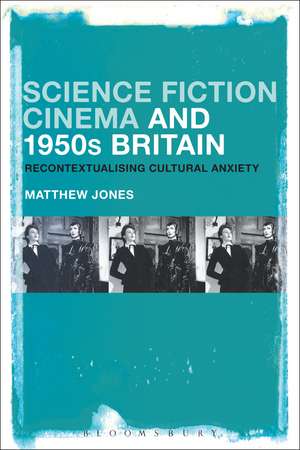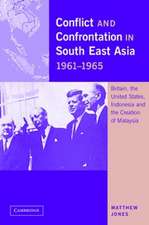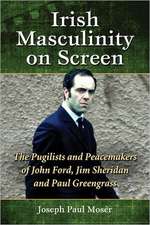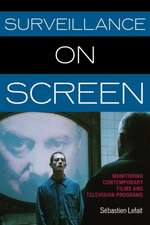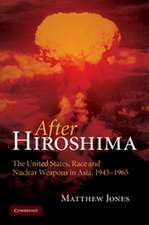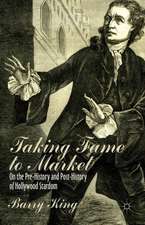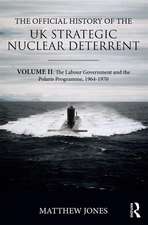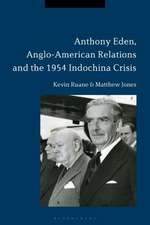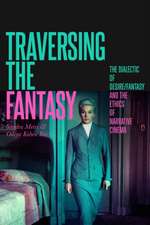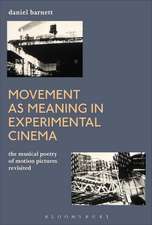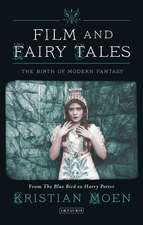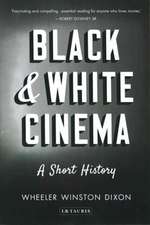Science Fiction Cinema and 1950s Britain: Recontextualizing Cultural Anxiety
Autor Matthew Jonesen Limba Engleză Hardback – 29 noi 2017
| Toate formatele și edițiile | Preț | Express |
|---|---|---|
| Paperback (1) | 230.33 lei 6-8 săpt. | |
| Bloomsbury Publishing – 29 mai 2019 | 230.33 lei 6-8 săpt. | |
| Hardback (1) | 715.73 lei 6-8 săpt. | |
| Bloomsbury Publishing – 29 noi 2017 | 715.73 lei 6-8 săpt. |
Preț: 715.73 lei
Preț vechi: 1028.38 lei
-30% Nou
Puncte Express: 1074
Preț estimativ în valută:
136.95€ • 143.00$ • 113.09£
136.95€ • 143.00$ • 113.09£
Carte tipărită la comandă
Livrare economică 15-29 aprilie
Preluare comenzi: 021 569.72.76
Specificații
ISBN-13: 9781501322532
ISBN-10: 1501322532
Pagini: 240
Ilustrații: 10 bw illus
Dimensiuni: 152 x 229 x 19 mm
Greutate: 0.54 kg
Editura: Bloomsbury Publishing
Colecția Bloomsbury Academic
Locul publicării:New York, United States
ISBN-10: 1501322532
Pagini: 240
Ilustrații: 10 bw illus
Dimensiuni: 152 x 229 x 19 mm
Greutate: 0.54 kg
Editura: Bloomsbury Publishing
Colecția Bloomsbury Academic
Locul publicării:New York, United States
Caracteristici
By turning the focus to British audiences of both domestic and American films, it offers an entirely new understanding of these films that is not available in other texts
Notă biografică
Matthew Jones is Associate Professor in Film Studies at De Montfort University, UK. He has published widely on mid-century cinema audiences and science fiction film and television. He is the co-editor of Time Travel in Popular Media: Essays on Film, Television, Literature and Video Games (2015).
Cuprins
AcknowledgementsIntroduction: Teacups and Flying SaucersSection A: Communist infiltration and indoctrination1. Soviet brainwashing, British defectors and the corruptive elsewhere2. 'He can be a Communist here if he wants to': Living with the monsterSection B: Nuclear technology3. The beast in the atom: Britain's nuclear nightmares4. Atomic Albion: Britain's nuclear dreamsSection C: Race and immigration5. It came from the colonies!: Mass immigration and the invasion narratives6. Loving the alien: After the Notting Hill race riotsSection D: Britain at home and abroad7. Still overpaid, still oversexed and still over here: The American invasion of Europe8. Science fiction Britain: The nation of the futureConclusionBibliographyIndex
Recenzii
This is the book on British 1950s sci-fi we've been waiting for! Authoritative, accessible, covering a wide range of films and directors, this is the one-stop volume on this key period in British cinema, carefully written and researched, making these films come alive for a whole new audience.
In this fascinating study of the British reception of 1950s American science fiction films, Matthew Jones shows that these films are more than just about the fear of communism and The Bomb. Boldly challenging critical orthodoxy, Jones' work has enormous implications for our wider understanding of genre and national cinema.
With this book, Matthew Jones provides a fascinating revisionary account of 1950s science fiction cinema. Through focusing on the specifically British reception of both British and American Sf films, Jones challenges the 'commie-baiting' readings that have become firmly associated with this kind of cinema and finds instead new and sometimes surprising significance, nuance and ambivalence. Accessible, stimulating and provocative, Jones's study is a valuable contribution to our understanding of British film culture during the 1950s. It is also a welcome reminder that films are as much defined through the contexts of their reception as they are through the circumstances of their production.
Science Fiction Cinema and 1950s Britain cleverly rethinks the reception of a range of genre films in the British context, challenging received wisdoms and revising established histories along the way. Matthew Jones skilfully re-reads the likes of monster movies, alien invasion narratives, and nuclear nightmares to show how British audiences of the time were unlikely to mirror the kinds of cinematic understandings historically linked to US culture. Rather than 'reds under the bed', this was an era of Establishment defectors in Britain, whilst Jones also analyses how 'atomic anxieties' were distinctively filtered through memories and practices of the "Blitz". Offering timely new ways of approaching 1950s science fiction cinema, this book brilliantly complicates film history's dominant accounts.
Received wisdom on the 1950s wave of English language science-fiction films views them primarily as articulating distinctively American fears of communist infiltration and nuclear science, albeit in allegorical form. In this volume Matthew Jones offers a more nuanced reading, reconsidering the films in their context of reception in Britain where, he argues, rather different public anxieties play into their likely understanding by audiences. In a UK in the throes of losing its empire the threat of communism was seen rather differently, attitudes to nuclear energy and science were arguably more complex, and race was becoming a significant factor in public perceptions. Re-examining the films in this cultural context gives rise to a fascinating study which obliges us both to rethink the traditional critical approach to 50s sf cinema and, more generally, to recognise that it is always necessary to pay full attention to the cultural landscapes within which films are received and understood.
In this fascinating study of the British reception of 1950s American science fiction films, Matthew Jones shows that these films are more than just about the fear of communism and The Bomb. Boldly challenging critical orthodoxy, Jones' work has enormous implications for our wider understanding of genre and national cinema.
With this book, Matthew Jones provides a fascinating revisionary account of 1950s science fiction cinema. Through focusing on the specifically British reception of both British and American Sf films, Jones challenges the 'commie-baiting' readings that have become firmly associated with this kind of cinema and finds instead new and sometimes surprising significance, nuance and ambivalence. Accessible, stimulating and provocative, Jones's study is a valuable contribution to our understanding of British film culture during the 1950s. It is also a welcome reminder that films are as much defined through the contexts of their reception as they are through the circumstances of their production.
Science Fiction Cinema and 1950s Britain cleverly rethinks the reception of a range of genre films in the British context, challenging received wisdoms and revising established histories along the way. Matthew Jones skilfully re-reads the likes of monster movies, alien invasion narratives, and nuclear nightmares to show how British audiences of the time were unlikely to mirror the kinds of cinematic understandings historically linked to US culture. Rather than 'reds under the bed', this was an era of Establishment defectors in Britain, whilst Jones also analyses how 'atomic anxieties' were distinctively filtered through memories and practices of the "Blitz". Offering timely new ways of approaching 1950s science fiction cinema, this book brilliantly complicates film history's dominant accounts.
Received wisdom on the 1950s wave of English language science-fiction films views them primarily as articulating distinctively American fears of communist infiltration and nuclear science, albeit in allegorical form. In this volume Matthew Jones offers a more nuanced reading, reconsidering the films in their context of reception in Britain where, he argues, rather different public anxieties play into their likely understanding by audiences. In a UK in the throes of losing its empire the threat of communism was seen rather differently, attitudes to nuclear energy and science were arguably more complex, and race was becoming a significant factor in public perceptions. Re-examining the films in this cultural context gives rise to a fascinating study which obliges us both to rethink the traditional critical approach to 50s sf cinema and, more generally, to recognise that it is always necessary to pay full attention to the cultural landscapes within which films are received and understood.
